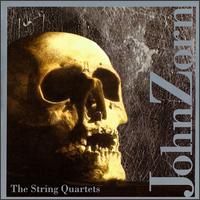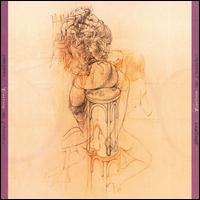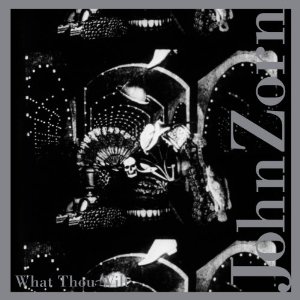
John Zorn is an American composer, arranger, record producer, saxophonist, and multi-instrumentalist with hundreds of album credits as performer, composer, and producer across a variety of genres including jazz, rock, hardcore, classical, surf, metal, soundtrack, ambient, and improvised music. He incorporates diverse styles in his compositions, which he identifies as avant-garde or experimental. Zorn was described by Down Beat as "one of our most important composers".

Grażyna Bacewicz was a Polish composer and violinist. She is the second Polish female composer to have achieved national and international recognition, the first being Maria Szymanowska in the early 19th century.

Filmworks 1986–1990 features the first released film scores of John Zorn. The album was originally released on the Japanese labels Wave and Eva in 1990, on the Nonesuch Records label in 1992, and subsequently re-released on Zorn's own label, Tzadik Records, in 1997 after being out of print for several years.
"For Zorn, filmscores have always been a place to experiment, and the FilmWorks Series is in many ways a microcosm of his prodigious output. This original installment of the FilmWorks Series presents three scores ranging from punk-rockabilly ; a jazzy Bernard Herrmann fantasy; to a quirky classical/improv/world music amalgam for Raul Ruiz's bizarre film The Golden Boat. Zorn's infamous one-minute arrangement of Morricone's classic The Good, The Bad and The Ugly, is included as a bonus track. This is the place where it all began."

Spillane is an album by American composer and saxophonist/multi-instrumentalist John Zorn, composed of three file-card pieces, as well as a work for voice, string quartet and turntables.

The Bribe: variations and extensions on Spillane is an album by American composer and saxophonist/multi-instrumentalist John Zorn, consisting of music created for three half-hour radio plays produced by Mabou Mines theater company in 1986. It utilizes compositional techniques, source material, and personnel that are similar to Zorn's Spillane.

Godard/Spillane is a compilation album by American composer and saxophonist/multi-instrumentalist John Zorn consisting of music created through Zorn's file-card compositional process. He first released the composition "Godard", a tribute to French film-maker Jean-Luc Godard whose jump-cut technique inspired Zorn's compositional approach, on the French tribute album "Godard" on French compilation Jean-Luc Godard|Godard ça vous chante? in 1986 on the French Nato label, "Spillane" was first released on Zorn's Nonesuch Records album Spillane in 1987 and "Blues Noël" was first released on the compilation album Joyeux Noël - Merry Christmas Everybody! on Nato in 1987.

Filmworks II: Music for an Untitled Film by Walter Hill features the second release of scores for film by John Zorn. The album was originally released on the Japanese Toys Factory label in 1995 and subsequently re-released on Zorn's own label, Tzadik Records, in 1996. It features the music that Zorn wrote and recorded for Trespass which not used in favor of a score by Ry Cooder.

Filmworks VIII: 1997 features two scores for film by John Zorn released on Zorn's own label, Tzadik Records, in 1998. It features the music that Zorn wrote and recorded for The Port of Last Resort (1998), a documentary directed by Joan Grossman and Paul Rosdy examining the experiences of Jewish refugees in Shanghai and Latin Boys Go to Hell (1997) which was directed by Ela Troyano.

Filmworks XI: Secret Lives features a score for film by John Zorn performed by the Masada String Trio with guest appearances from Vanessa Saft on vocals and Jamie Saft on piano. The album was released on Zorn's own label, Tzadik Records, in 2002 and contains music that Zorn wrote and recorded for Secret Lives: Hidden Children and Their Rescuers During WWII, a documentary on Jewish children hidden during the Second World War directed by Aviva Slesin. The documentary was originally to be titled Under the Wing and several sources still refer to the soundtrack under this name.

Angelus Novus is an album of contemporary classical music by American composer and alto saxophonist/multi-instrumentalist John Zorn including compositions written in 1972 ("Christabel"), and 1983.

The String Quartets is an album of contemporary classical music by American composer and saxophonist/multi-instrumentalist John Zorn performed by Mark Feldman, Erik Friedlander, Joyce Hammann and Lois Martin. The piece Kol Nidre is a tune from Zorn's Masada songbook.

Cartoon/S&M is a double album of contemporary classical music by American composer John Zorn. The piece Kol Nidre which appears in two versions on this recording is a tune from Zorn's Masada songbook.

Madness, Love and Mysticism is an album of contemporary classical music by American composer John Zorn released in 2001 on the Tzadik label.

Rituals is an album of contemporary classical music by American avant-garde composer John Zorn. The piece takes the form of an opera in five parts and was premiered at the Bayreuth Opera Festival in 1988.

Chimeras is an album of contemporary classical music by American composer John Zorn featuring a 12 part piece inspired by Arnold Schoenberg's atonal composition "Pierrot Lunaire". In 2010 the album was revised and re-recorded, with an additional "Postlude".

Zohar is an album by the Mystic Fugu Orchestra (John Zorn and Yamataka Eye who perform a range of music inspired by historical recordings of ancient Judaica. To simulate the "antiquity" of these recordings, a heavy layer of surface noise was overlaid on the music to represent the playing quality of a 78 rpm gramophone record.

What Thou Wilt is an album of contemporary classical music composed by John Zorn and released in October 2010 on the Tzadik label. It was originally composed in 1999, nearly 20 years prior to release. It features many of Zorn's prominent collaborators, including Erik Friedlander, Stephen Drury, and Fred Sherry.

Nosferatu is an album by John Zorn released on the Tzadik label in April 2012 on the 100th Anniversary of Bram Stoker's death. Zorn wrote the score as a commission for a Polish theatre group's adaption of Stoker's novel Dracula.

Femina is an album by John Zorn recorded in New York City in December 2008 and released on the Tzadik label in October 2009. The album is a tribute to the artistic creativity of women.

Lake Biwa is a studio album by American jazz trumpeter and composer Wadada Leo Smith released on John Zorn's Tzadik label in 2004. The album contains four pieces composed between 2000 and 2004.




















